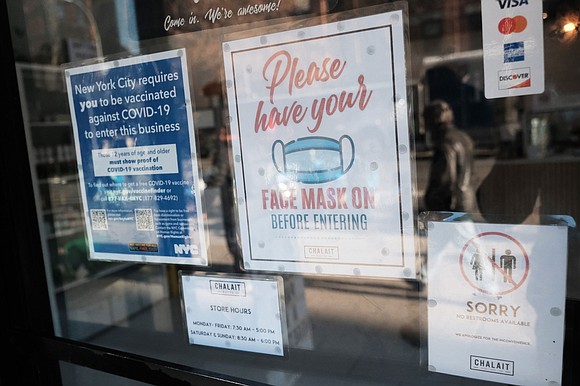Between Christmas and New Year's, doctors expect the US Omicron surge to grow
CNN/Stylemagazine.com Newswire | 12/27/2021, 11:31 a.m.

Originally Published: 27 DEC 21 03:55 ET
Updated: 27 DEC 21 10:45 ET
By Holly Yan and Aya Elamroussi, CNN
(CNN) -- Covid-19 numbers keep soaring as Christmastime travelers scatter back across country and Americans prepare for another holiday weekend.
The US is now averaging 198,404 new Covid-19 cases each day, according to Sunday data from Johns Hopkins University. That's is 47% higher than a week ago and the highest such number since January 19.
"I think we're going to see half a million cases a day -- easy -- sometime over the next week to 10 days," CNN medical analyst Dr. Jonathan Reiner told CNN on Sunday.
About 71,000 Americans were hospitalized with Covid-19 as of Sunday, according to the US Department of Health and Human Services.
And an average of 1,408 Americans died from Covid-19 each day during the week ending Sunday, according to Johns Hopkins. That's a 17% increase from the prior week.
With the highly contagious Omicron variant, "We're certainly going to continue to see a surge (in cases) for a while," Dr. Anthony Fauci told CNN on Monday.
Looking ahead to New Year's Eve on Friday, small gatherings of fully vaccinated people will be safe, Fauci said. But he advised people to avoid large parties where they don't know the vaccination status of all guests.
"When you are talking about a New Year's Eve party where you have 30, 40, 50 people celebrating, you do not know the status of the vaccination, I would recommend strongly: Stay away from that this year," said Fauci, the director of the National Institute of Allergy and Infectious Diseases.
"There will be other years to do that. But not this year."
New York City enacts new vaccine mandate
New York state broke a single-day record for new Covid-19 cases, with 49,708 new Covid-19 cases reported on Christmas Eve, according to data released on Sunday by Gov. Kathy Hochul's office.
"As we come home from holiday gatherings, it is as important as ever to take precautions to limit the spread of COVID-19 this season," Hochul said in a statement. "The vaccine is the best tool we have to keep ourselves and our loved ones safe as we head into the new year."
The average number of daily new Covid-19 cases in New York City skyrocketed 644% in the past two weeks to 19,268, according to The New York Times.
The highly contagious Omicron variant was a factor in New York City Mayor Bill de Blasio's decision to implement a vaccine mandate for private sector employees, effective Monday. The updated rules require workers to have at least one dose of Covid-19 vaccine by Monday and don't allow employees to opt out through regular testing.
Children ages 5 to 11 in New York are now also required to show proof of at least one shot before being allowed into indoor dining, fitness or entertainment venues. And adults must show proof of two vaccinations for those areas.
The private-sector requirements align with those already in place for the city's public-sector employees and similar restrictions in major cities around the country.
"We need to take very bold action," de Blasio said. "We're seeing restrictions starting to come back. We're seeing shutdowns," he said. "We cannot let those restrictions come back. We cannot have shutdowns in New York."
The city is still planning a "scaled back" New Year's Eve celebration.
Fully vaccinated health care workers get new isolation guidance
As more hospitals get overwhelmed, the CDC has issued new guidance that will allow some health care workers who get Covid-19 to return to work faster. Fully vaccinated medical workers who test positive but don't have symptoms can go back to work in seven days if they test negative within 48 hours of their return to work.
That "isolation time can be cut further if there are staffing shortages," the CDC said Thursday.
But the new guidelines are only for health care workers. For the general public, the CDC still recommends those with Covid-19 isolate for 10 days regardless of whether they have symptoms.
The new, emergency guidance for health care workers was made due to concerns about the Omicron variant and potential staff shortages, the CDC said. The agency "continues to evaluate isolation and quarantine recommendations for the broader population as we learn about the Omicron variant and will update the public as appropriate," it said.
Currently, about 75% of all ICU beds in the country are in use and 21% are occupied by Covid-19 patients, data from the US Department of Health and Human Services shows.
Holiday travelers stranded as Omicron surges
Thousands of flights were canceled over the holiday weekend -- partly due to winter weather but largely due to reduced airline staffing as employees called out sick.
More than 2,000 flights were canceled Monday, according to the flight tracking website FlightAware. That's on top of roughly 1,200 Sunday flights that were canceled.
And at least four ocean cruise ships were turned away from ports or prohibited from letting passengers disembark this past week because of Covid-19 cases on board.
Sporting events have also been postponed or canceled due to increased spread of Covid-19. At least five college football bowl games have been affected, including two games called off over the weekend. Pro basketball and hockey also have been slowed by the virus.
The best way to protect against severe illness is to get vaccinated and boosted, Fauci said.
"Boosters are always good for any variant, but particularly for Omicron," he said.
"If you are vaccinated and not yet boosted, and your time comes for getting boosted, please get boosted. It's going to make all the difference to prevent you from getting severe disease."









